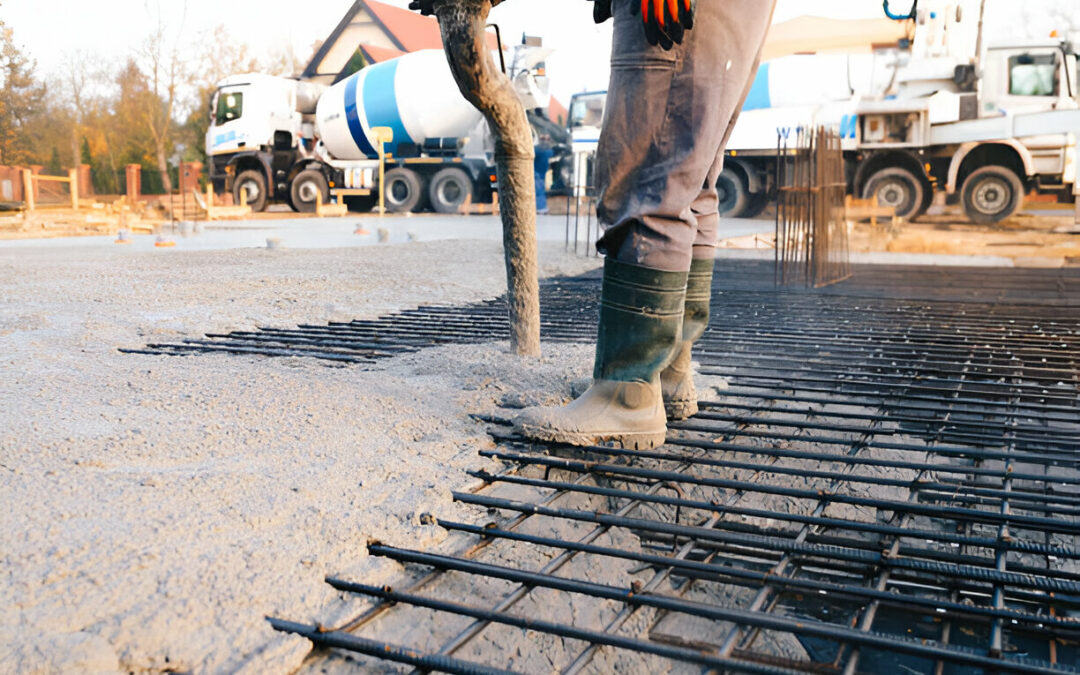When planning to hire concrete contractors, spring and fall are often ideal seasons due to their mild temperatures, which are perfect for pouring and curing concrete.
While summer can increase productivity with its heat, it may also lead to delays and higher costs due to unpredictable conditions.
On the other hand, winter poses several challenges that can complicate concrete work. Beyond the weather, it’s essential to consider other factors that can impact your project’s success.
Understanding these elements will help you make informed decisions for your concrete project.
Spring Considerations
Spring offers the perfect weather for concrete projects. With milder temperatures, it’s easier for concrete to cure properly, ensuring a stronger and longer-lasting result. This avoids the harsh conditions of winter, like frost and freezing temperatures, which can damage the project.
- Mild Temperatures: Helps the curing process of concrete.
- No Winter Damage: Avoids frost and freezing issues.
Increased Availability and Flexibility
As many homeowners begin outdoor projects in spring, contractors may have more availability. This can offer you better scheduling options and greater flexibility in planning your project.
- More Availability: Contractors are often more flexible during spring.
- Fewer Scheduling Conflicts: Easier to secure your desired timeline.
Material Availability and Weather Contingencies
With spring comes better access to materials, as winter delays become less of an issue. However, spring rains can be unpredictable, so it’s important to discuss weather contingencies with your contractor to ensure the project remains on track.
- Faster Material Access: Fewer delays due to weather.
- Plan for Rains: Discuss ways to protect the project from unexpected showers.
In summary, spring provides the optimal conditions for concrete projects, offering better weather, availability, and fewer delays, making it an excellent season to start your project.
Summer Advantages and Challenges
The warmer weather and longer daylight hours offer several benefits for concrete projects. Concrete cures faster in these conditions, allowing for quicker project completion. Many homeowners also take advantage of summer to start their outdoor projects, which can lead to increased availability among contractors.
- Faster Curing: Concrete sets quickly in warm temperatures.
- Longer Working Hours: Extended daylight helps contractors work efficiently.
- Increased Availability: Contractors often have more time to take on new projects.
Challenges of Summer Concrete Projects
While summer provides optimal working conditions, higher temperatures can also cause issues. Rapid evaporation may lead to surface cracking if not carefully managed. It’s crucial to hire a contractor who has experience in handling these conditions and knows how to maintain the proper curing techniques.
- Surface Cracking: Can occur due to rapid evaporation.
- Experience Needed: Ensure your contractor is familiar with summer conditions.
Managing Scheduling and Costs
Summer is the peak construction season, which may lead to scheduling delays and higher prices. It’s important to discuss your timeline and budget with your contractor in advance to avoid surprises.
- Peak Season Delays: Contractors may have packed schedules.
- Potential Price Increases: Higher demand could lead to increased costs.
By understanding the advantages and challenges of summer concrete projects, you can make informed decisions and ensure your project runs smoothly and efficiently. Clear communication with your contractor will help set expectations and navigate the season’s challenges.
Fall and Winter Insights
Fall offers a unique blend of mild weather and beautiful autumn scenery, making it an ideal time for exterior concrete work. With fewer weather disruptions, you can expect a smoother project timeline.
Many contractors also have more availability during the fall, which can lead to better pricing and quicker scheduling.
- Milder Weather: Ideal for outdoor projects.
- Beautiful Backdrop: Autumn’s earthy tones enhance your finished concrete work.
- Better Availability: Contractors often have more flexibility.
Challenges of Fall Projects
Rain can be a factor in fall, and wet conditions may impact the quality of your concrete pour. It’s important to have contingency plans with your contractor to protect the project from unexpected showers.
- Rain Delays: Wet conditions may affect the pour.
- Quality Control: Ensure proper protective measures are in place.
Winter Concrete Projects: Considerations
Winter concrete projects come with their own set of challenges, particularly cold temperatures and snow. Cold weather can slow down the curing process, so timing is critical. However, some experienced contractors have methods to work around these conditions, such as using heated enclosures or additives to accelerate curing.
- Cold Weather Delays: Slower curing times in freezing temperatures.
- Snow and Ice: Potential for weather-related delays.
- Experienced Contractors: Make sure your contractor has winter project experience.
Fall and winter can both offer opportunities for concrete projects, but proper planning and communication with your contractor are essential.
By understanding the impact of seasonal weather on your project, you can make the most of these colder months and ensure your concrete work is done efficiently and effectively.
Choosing the best season to hire concrete contractors depends on a balance of weather, contractor availability, and project requirements. Spring and fall are generally the ideal times for optimal weather conditions, material availability, and flexibility.
However, with the right contractor, summer and even winter projects can be successfully completed, with the necessary precautions in place to mitigate challenges.
By understanding the seasonal dynamics and working closely with a skilled contractor, you can ensure your concrete project is completed efficiently, on time, and to the highest standards.

